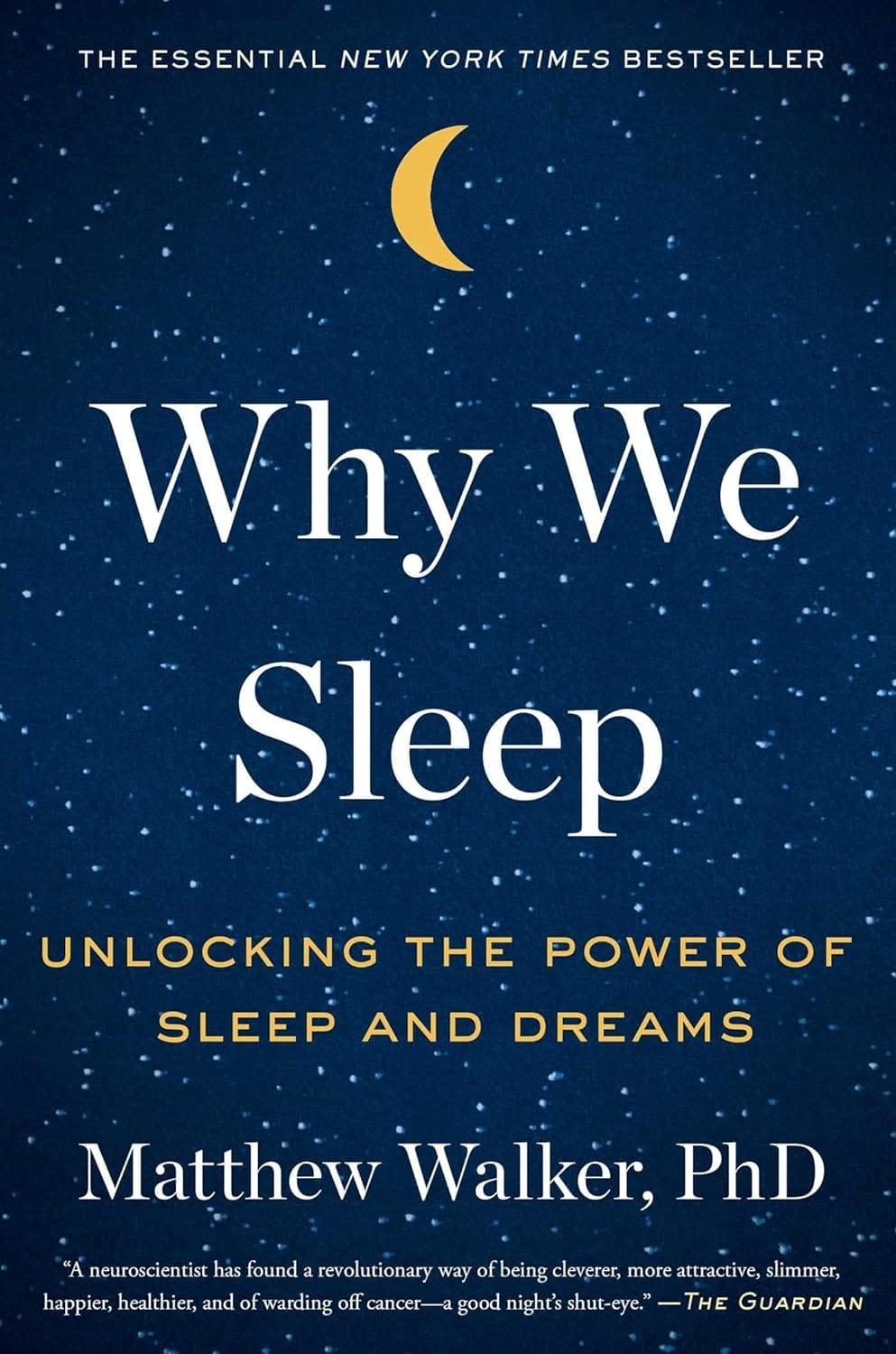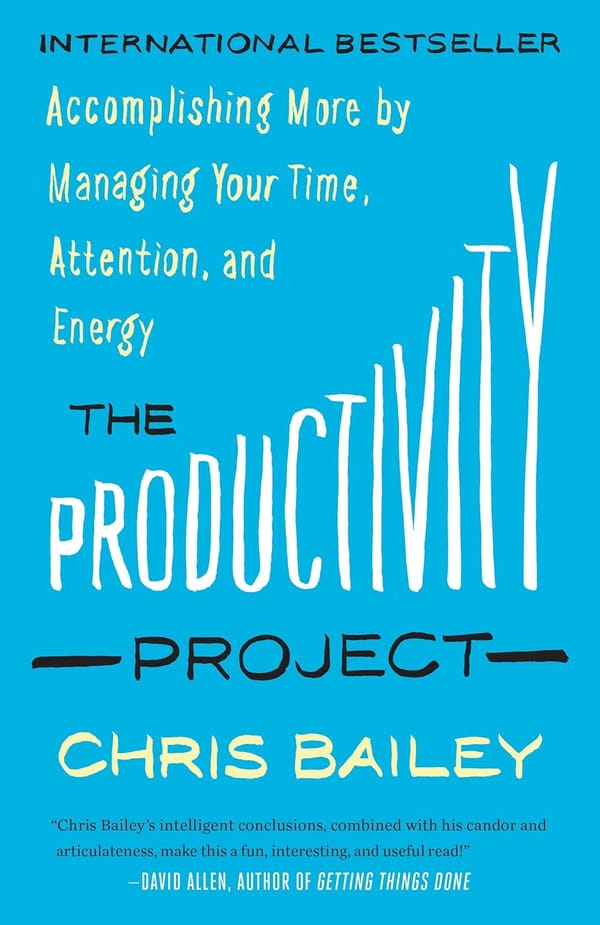Why We Sleep - Book Notes
Discover how the book "Why We Sleep" by Matthew Walker revolutionizes your understanding of sleep, unveiling its profound impact on physical vitality and cognitive function. From unraveling the mysteries of REM and NREM sleep to navigating modern challenges hindering optimal rest, embark on a journey towards prioritizing sleep as the ultimate cornerstone of holistic well-being. Join me as I delve into practical insights and actionable strategies that empower you to unlock the full potential of a good night's rest, transforming your health and vitality from the inside out.
If you enjoyed my review, consider supporting me by using the affiliate links below to purchase the book. Your kindness fuels my passion for sharing captivating reads with you!
🚀 The Book in 3 Sentences
- "Why We Sleep" by Matthew Walker explores the intricate mechanisms and profound importance of sleep in our lives.
- Delving into topics such as the circadian rhythm, REM and NREM sleep, and the impact of sleep on physical and mental health, Walker highlights the critical role of sleep in promoting overall well-being and cognitive function while addressing contemporary challenges such as artificial light exposure, alcohol consumption, and work demands that hinder optimal sleep quality.
- Through practical insights and evidence-based recommendations, the book underscores the necessity of prioritizing sleep as a cornerstone of holistic health and vitality in modern society.
👱 Who Should Read it?
Everyone. Period.
🍀 How the Book Changed Me
I was always in the camp "sleep is for the weak" and seeing sleep as "unproductive", something that I want to get done as fast as possible. This book completely changed my view about sleep and I finally started to take it serious (better late than never). I immediately bought a smart watch that is able to track my sleep and started to realize how bad the situation really was. I was only sleeping for an average of about 5.5 hours a night!!!
I then started to apply some of the 12 Tips for Better Sleep (see the full list below), namely setting an alarm for bedtime, exercise at least 30 minutes a day, increase my sun exposure in the morning by taking a walk outside and decreasing artificial light in the evening by switching off my phone after 9 PM and only reading with an E-Reader before going to bed, and finally completely avoiding caffeine after lunch.
✍️ Top 3 Quotes
- "The shorter your sleep, the shorter your life span."
- "Sleep is the single most effective thing we can do to reset our brain and body health each day."
- "The decimation of sleep throughout industrialized nations is having a catastrophic impact on our health, our wellness, even the safety and education of our children."
🔨 3 Action Points
- Establish a Consistent Sleep Schedule:
Set a regular bedtime and wake-up time, even on weekends, to regulate your body's internal clock and promote better sleep quality. - Create a Sleep-Conducive Environment:
Make your bedroom a comfortable and relaxing space by minimizing noise, light, and electronic distractions. Adjust the room temperature to promote optimal sleep conditions, and consider investing in a comfortable mattress and pillows. - Practice Good Sleep Hygiene:
Adopt habits that support healthy sleep patterns, such as winding down with calming activities before bed, avoiding caffeine and alcohol close to bedtime, and limiting screen time in the hours leading up to sleep. Additionally, prioritize regular exercise, but avoid vigorous workouts too close to bedtime, as they can interfere with your ability to fall asleep.
📗 Summary & Notes
Understanding the Circadian Rhythm
At the core of our sleep-wake cycle lies the suprachiasmatic nucleus, a tiny structure in the brain acting as our internal clock. This clock, known as the circadian rhythm, regulates a plethora of bodily functions beyond just sleep and wakefulness. From dictating our eating habits to influencing hormone release and body temperature, the circadian rhythm orchestrates a symphony of biological processes essential for our well-being.
Zeitgebers: Nature's Timekeepers
While sunlight remains the primary cue for resetting our internal clock, other external cues, known as zeitgebers, also play a role. These can include factors like meal timing, physical activity, or even changes in temperature. Understanding how these zeitgebers interact with our circadian rhythm sheds light on why disruptions, such as jet lag, can have profound effects on our sleep and overall health.
The Role of Melatonin
Although often associated with sleep induction, melatonin's role extends beyond mere sleep initiation. While it signals the onset of nighttime to our bodies, its influence on the actual generation of sleep is minimal. Instead, melatonin serves as a messenger, conveying the time for sleep to our biological systems.
The Impact of Sleep Pressure
As we go about our day, adenosine, a chemical compound, accumulates in our brains, gradually increasing our desire to sleep. This phenomenon, known as sleep pressure, highlights the intricate interplay between our waking activities and the subsequent need for rest. Understanding how caffeine interferes with adenosine receptors provides insight into why its consumption can disrupt sleep patterns.
The Dynamics of REM and NREM Sleep
Sleep is a complex phenomenon characterized by distinct stages, each serving unique physiological and psychological functions. Rapid eye movement (REM) sleep, often associated with vivid dreaming, plays a crucial role in emotional processing and memory consolidation. During REM sleep, the brain exhibits heightened activity, resembling that of wakefulness, while the body remains largely immobile, a phenomenon known as REM atonia.
REM sleep is essential for emotional regulation, allowing the brain to process and integrate challenging or traumatic experiences. This stage of sleep is particularly adept at extracting the essence of our daily experiences, distilling complex emotions into manageable fragments. Furthermore, REM sleep facilitates creative problem-solving and fosters insight by forging connections between disparate pieces of information.
Conversely, non-rapid eye movement (NREM) sleep encompasses several stages, with deep NREM sleep predominating early in the night. This stage is characterized by slow-wave sleep, during which the brain exhibits synchronized, slow-frequency delta waves. Deep NREM sleep is crucial for physical restoration and cognitive function, promoting cellular repair, hormone regulation, and memory consolidation.
The Decline of Sleep Efficiency with Age
As we age, our sleep patterns undergo significant changes, with deep NREM sleep declining in both quality and quantity. This decline in sleep efficiency, coupled with other factors like increased susceptibility to sleep disorders, underscores the importance of prioritizing sleep health throughout the lifespan.
The Positive Effects of Sleep on the Body and Mind
- Physical Restoration: Sleep is a time of profound physical rejuvenation, during which the body repairs tissues, synthesizes proteins, and replenishes energy stores. Deep NREM sleep, in particular, plays a pivotal role in facilitating these processes, contributing to overall health and vitality.
- Cognitive Function: Adequate sleep is essential for optimal cognitive function, including memory consolidation, problem-solving, and decision-making. Both REM and NREM sleep stages contribute to cognitive processing, with REM sleep fostering creativity and emotional resilience, while NREM sleep enhances learning and information retention.
- Emotional Regulation: Sleep plays a crucial role in emotional regulation, helping to modulate mood, reduce stress, and promote psychological well-being. REM sleep, in particular, facilitates the processing and integration of emotional experiences, allowing individuals to navigate challenging situations with greater resilience.
- Immune Function: Sleep is intricately linked to immune function, with insufficient sleep compromising the body's ability to defend against pathogens and infections. Adequate sleep enhances immune response, promotes the production of immune cells, and accelerates healing processes, supporting overall health and resilience.
The Negative Effects of Sleep Deprivation
- Cognitive Impairment: Sleep deprivation impairs cognitive function, leading to deficits in attention, memory, and executive function. Chronic sleep deficiency hampers learning and problem-solving abilities, diminishing academic and occupational performance.
- Emotional Instability: Sleep deprivation exacerbates emotional reactivity and impairs emotional regulation, increasing susceptibility to mood disorders such as depression and anxiety. Heightened emotional volatility and irritability are common consequences of sleep deficiency.
- Physical Health Risks: Chronic sleep deprivation is associated with an increased risk of various physical health conditions, including obesity, diabetes, cardiovascular disease, and immune dysfunction. Sleep deficiency disrupts hormonal balance, alters metabolism, and contributes to systemic inflammation, predisposing individuals to chronic illness.
- Impaired Immune Function: Inadequate sleep compromises immune function, weakening the body's ability to fight off infections and illnesses. Sleep deprivation diminishes the production of immune cells and impairs the body's ability to mount an effective immune response, leaving individuals more vulnerable to infections.
Trends Working Against Good Sleep
In our modern society, several prevalent trends and lifestyle factors can disrupt natural sleep patterns and contribute to sleep disturbances. Understanding these trends is crucial for mitigating their impact and promoting healthier sleep habits.
1. Artificial Light and Screen Time
The widespread use of electronic devices emitting blue light, such as smartphones, tablets, and computers, has become a significant disruptor of sleep patterns. Exposure to artificial light in the evening suppresses melatonin production, delaying the onset of sleep and disrupting the circadian rhythm. Moreover, excessive screen time before bedtime can overstimulate the brain, making it difficult to unwind and fall asleep.
2. Alcohol Consumption
While alcohol may initially induce drowsiness and promote relaxation, its effects on sleep quality are detrimental in the long term. Alcohol disrupts the natural sleep cycle, suppressing REM sleep and fragmenting sleep patterns. As a result, individuals who consume alcohol before bedtime may experience frequent awakenings, reduced sleep efficiency, and next-day grogginess.
3. Temperature Regulation
Modern climate control systems often maintain a constant indoor temperature throughout the day and night. However, optimal sleep occurs when the body's core temperature drops slightly, signaling the onset of sleep. Artificially maintaining a constant temperature in the sleep environment may interfere with this natural cooling process, making it harder to initiate and maintain sleep.
4. Work and Education Demands
The demands of work and education in today's society often prioritize productivity and achievement over adequate rest and recovery. Long work hours, demanding schedules, and academic pressures can lead to chronic sleep deprivation and heightened stress levels. Additionally, irregular work shifts, such as night shifts or rotating schedules, disrupt the circadian rhythm and compromise sleep quality.
5. Dependence on Sleep Aids
In an effort to combat sleep difficulties, many individuals turn to sleep aids, including prescription medications and over-the-counter supplements. While these interventions may provide short-term relief, they often come with risks and side effects. Dependence on sleep aids can lead to rebound insomnia, tolerance, and dependency, exacerbating sleep disturbances in the long run.
Addressing Challenges for Better Sleep
Recognizing the impact of these modern trends on sleep quality is the first step towards promoting healthier sleep habits. Implementing strategies to mitigate the effects of artificial light exposure, regulating sleep environments for optimal temperature, and prioritizing relaxation techniques before bedtime can all contribute to better sleep hygiene.
Moreover, fostering a culture that values and prioritizes sleep as a fundamental pillar of health and well-being is essential. Employers and educational institutions can support employee and student well-being by implementing policies that promote work-life balance, flexible scheduling, and opportunities for rest and rejuvenation.
By raising awareness of the factors contributing to sleep disturbances and advocating for systemic changes that prioritize sleep health, we can collectively work towards a society that values and supports restorative sleep for all.
Practical Tips for Better Sleep
Incorporating simple lifestyle changes can make a world of difference in improving sleep quality. From maintaining a consistent sleep schedule to creating a conducive sleep environment and practicing relaxation techniques, prioritizing sleep hygiene is key to reaping the benefits of a good night's rest.
12 Rules for Better Sleep
- Stick to a sleep schedule. Set an alarm for bedtime, instead of an alarm for waking up.
- Exercise at least 30 minutes a day.
- Avoid caffeine and nicotine.
- Avoid alcoholic drinks before bed.
- Avoid large meals and beverages late at night.
- Avoid medicines that delay or disrupt sleep.
- Don't take naps after 3 p.m.
- Relax before bed.
- Take a hot bath before bed.
- Dark bedroom, cool bedroom, gadget-free bedroom.
- Have the right sunlight exposure.
- Don't lie in bed awake.
Conclusion: Embracing the Power of Sleep
In conclusion, "Why We Sleep" by Matthew Walker unveils the transformative impact of sleep on our physical health, cognitive function, and emotional well-being. Through practical insights and evidence-based recommendations, Walker empowers us to prioritize sleep as a cornerstone of vitality and resilience.
By cultivating a sleep-conducive environment, establishing consistent sleep schedules, and advocating for systemic changes that prioritize sleep health, we lay the foundation for a society that cherishes rest as a non-negotiable pillar of well-being.
Let us heed the wisdom of "Why We Sleep" and embark on a journey of self-discovery and renewal—one where the embrace of sleep is a revolutionary act of reclaiming our vitality and resilience. Together, let us awaken to a brighter, more vibrant tomorrow.



